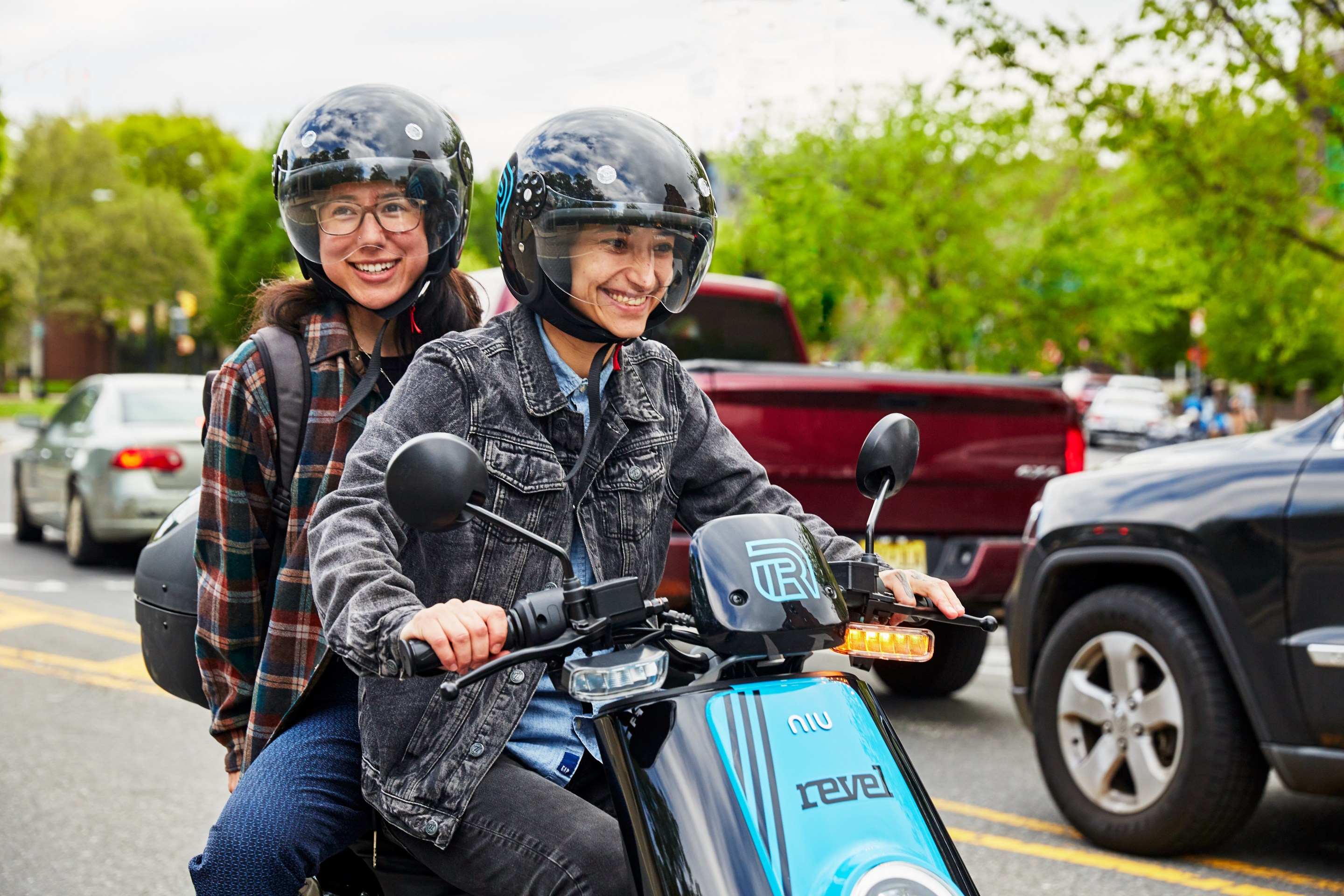Smile — you're on helmet camera!
Electric scooter share company Revel is rolling out additional safety measures today that include mandatory in-app training and a required helmet selfie, a company spokesperson said — but the new national policy won't go into effect just yet in New York City, where Revel was forced to shut down last month following two fatal crashes in consecutive weeks.
The new "safety course" includes a 20-minute multiple choice test that will help riders learn the rules of the road and how to use the scooter. Users must complete the test in one sitting — meaning getting every question right two times (the question will be repeated until you answer correctly). Users will not be able to unlock a scooter before taking the test starting on Sept. 1.
It's exactly the kind of measure that the company determined would be necessary in an internal audit commissioned by Revel that reviewed 884,910 rides in 2019. As Streetsblog reported last month, the study found that riders drove the scooters an average of 12.3 mph — about 18 mph slower than their maximum speed — and that there were 155 crashes that ended in injury or property damage, which is a rate of one crash per 5,700 rides. Of those crashes, 30 percent were attributed to people who had used Revel five times or less.
The report also recommended mandatory in-person lessons for new riders without motorcycle experience, or making the then-optional “how-to” videos mandatory for new riders.
“[Mandatory lessons] are key to getting people to use micromobility more safely,” Sarah Kaufman, a transportation and technology researcher and one of the report’s authors, told Streetsblog. “People would have an easier time figuring out the vehicle and the nuances to riding a moped like with turning, for example.”
Starting today in other Revel cities — such as Miami, the Bay Area and Washington, D.C. — riders will now be required to complete the video, and upload a picture of themselves with a helmet affixed in place. Revel provides two helmets with each scooter. (The report had recommended something a bit more fool-proof: "Ensure that riders are wearing the required helmets through sensors or other technological solutions," but the company obviously concluded that a selfie is enough.)
The safety enhancements have been long expected. On July 26, just two days before Revel paused its service in New York, the company sent an e-mail to all its customers warning that new safety measures would be coming soon. But they didn't hit the streets in time: On July 28, 32-year-old Jeremy Malave died after he crashed his Revel into a light pole in Queens. The fatality came just 10 days after CBS2 reporter Nina Kapur became the first New Yorker killed on a Revel after she was thrown from a scooter driven by a friend in Greenpoint.
The suspension was voluntary, but came under pressure from Mayor de Blasio, who derided Revel as a “new technology” that had not yet proven it could be safe. Meanwhile, the city has demanded no new safety requirements for, or limitations on, the makers or operators of automobiles, who have killed thousands of people on New York City streets since the mayor took office in 2014.
After two rider deaths in NYC, moped rental company Revel now requiring mandatory 20-min virtual training and selfies showing you are wearing a helmet. pic.twitter.com/MAp2TW5j6c
— Jordan Pascale🎙️ (@JWPascale) August 18, 2020
Revel launched in 2018 in Brooklyn's “brownstone belt" and a thin slice of western Queens in 2018, and proved so popular and crucial that it expanded into Manhattan earlier this year as part of an effort to serve essential and healthcare workers during the coronavirus pandemic.
Revel shared its new safety protocols with the de Blasio administration. Approval — and the return of Revel — is pending, a City Hall spokesperson told Streetsblog.
@_GoRevel is getting ready to reboot its service in NYC. I've been impressed with how they've used this pause to strengthen safety protocols. It's important we get their over 300 employees back to work & continue offering alternative transportation options to New Yorkers.
— Antonio Reynoso (@ReynosoBrooklyn) August 17, 2020
Revel declined to comment on its additional safety features or its plans for rebooting service in New York City.






